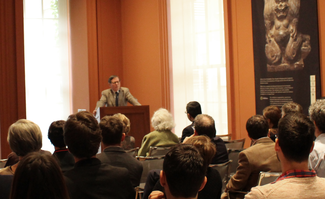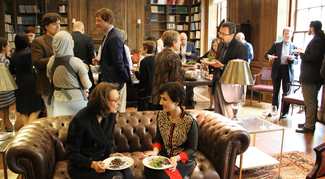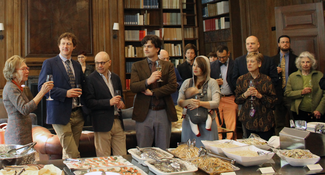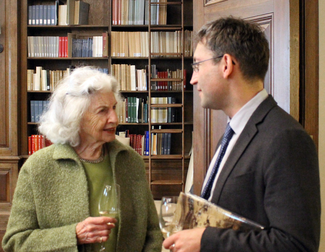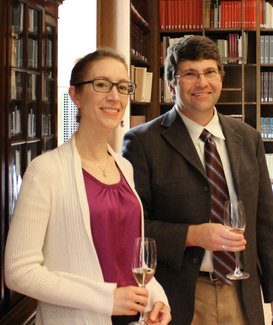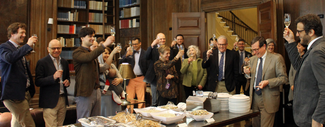Commencement 2016
This article first appeared in ISAW Newsletter 15, Spring 2016.
Roger Bagnall
Leon Levy Director and Professor of Ancient History
Commencement Address
May 17th, 2016
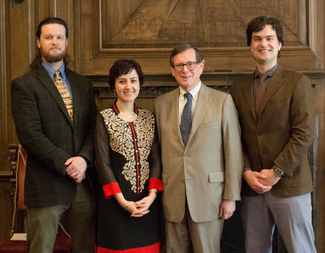 Leon Levy Director Roger Bagnall with the first graduates of ISAW’s doctoral program. Left to Right: Randolph Ford, Mehrnoush Soroush, Roger Bagnall, and Erik Hermans
The past nine years have been the era of the invention of ISAW, in which every year brought some “first” in our institutional life, from the first public event (the first Leon Levy Lecture, in the fall of 2007, given by Glen Bowersock), down to today—the celebration of our first completed doctorates, following on our first round of successful dissertation defenses. The three young scholars we gather to celebrate have been true pioneers, members of the first two cohorts to apply and be admitted to the doctoral program—in the case of Mehrnoush Soroush, who was part of the first group, fearlessly applying to a program that was what in the digital world could have been called vaporware: it didn’t really exist except as a concept and a promise. Taking students into doctoral programs is always a matter of risk-taking by both sides, but in this case it was truly the student who was taking the larger risk. For that courage, I salute and thank all of our graduates. They bet on ISAW when it barely had come into existence, when it did not yet have all of the faculty they would need to complete their degrees. But we also thank them for the quality of their work and for its fulfillment of ISAW’s mission to cross all sorts of lines and find connections and comparisons that otherwise would not have been visible.
Leon Levy Director Roger Bagnall with the first graduates of ISAW’s doctoral program. Left to Right: Randolph Ford, Mehrnoush Soroush, Roger Bagnall, and Erik Hermans
The past nine years have been the era of the invention of ISAW, in which every year brought some “first” in our institutional life, from the first public event (the first Leon Levy Lecture, in the fall of 2007, given by Glen Bowersock), down to today—the celebration of our first completed doctorates, following on our first round of successful dissertation defenses. The three young scholars we gather to celebrate have been true pioneers, members of the first two cohorts to apply and be admitted to the doctoral program—in the case of Mehrnoush Soroush, who was part of the first group, fearlessly applying to a program that was what in the digital world could have been called vaporware: it didn’t really exist except as a concept and a promise. Taking students into doctoral programs is always a matter of risk-taking by both sides, but in this case it was truly the student who was taking the larger risk. For that courage, I salute and thank all of our graduates. They bet on ISAW when it barely had come into existence, when it did not yet have all of the faculty they would need to complete their degrees. But we also thank them for the quality of their work and for its fulfillment of ISAW’s mission to cross all sorts of lines and find connections and comparisons that otherwise would not have been visible.
Like scholarly publishing, doctoral study in humanistic disciplines seems always to be in crisis. I’m sure that everyone here is aware of the constant barrage of debate over its future in an era when the ability of graduates to find suitable positions is uncertain and when society seems gripped by a coarse utilitarianism concerning education in general. A difficult employment situation for PhDs is in fact also a hardy perennial; it was only in a couple of exceptional postwar decades of expansion that academic jobs were plentiful. But the habits of mind developed by doctoral education are not narrowly limited to the academic world. We cannot foresee what further upheaval will come from the transformation of the entire system by which information and knowledge are distributed in our society. But the abilities to do research, to think, to write, and to communicate in speech are not about to become obsolete.
What we do is more than the acquisition of skills, however, even though those are important. Our mission has to do with what we use these for, namely the attempt to understand humanity and its interaction with the world environment over long stretches of the deep past. The conviction that this type of understanding, and the innate curiosity that drives such inquiry, are fundamental to what it means to be human was at the root of ISAW’s foundation. We give a central place to free inquiry not restricted by the artificial boundaries of modern disciplines or by the possessiveness of national, ethnic, or religious identity politics. Behind the specific dissertation topics of each of our graduates lie human beings trying to make their way in the world, to manage their natural environment, to feed themselves and their families, to transmit culture and knowledge to their young, and to make sense of the world in which they live. These people are our underlying subject.
Our Graduates
Prior to enrolling in the doctoral program at ISAW, Randolph Ford received his BA and MA in Scandinavian Studies with a focus on Old Icelandic/Old English Literature from the University of Wisconsin, where he also completed coursework in Classics and East Asian Studies. Randolph successfully defended his doctoral dissertation, entitled “Ethnographic Identities and the Politics of Legitimacy in Late Roman and Early Medieval Chinese Historiography,” at ISAW on November 20, 2015.
Before arriving at ISAW, Erik Hermans received his BA and MPhil in Greek and Latin Literature and Ancient History from the Radboud University Nijmegen in the Netherlands. He also studied at the University of Amsterdam, the University of Ghent (Belgium), and the University of Oxford. His doctoral dissertation, which he defended at ISAW on December 15, 2015, is entitled “Aristotle from York to Basra: An Investigation into the Simultaneous Study of Aristotle’s Categories in the Carolingian, the Byzantine and the Abbasid Worlds.”
Mehrnoush Soroush received her MA in Architecture from the University of Tehran, Iran, with an emphasis on the management and rehabilitation of historic urban quarters. After her graduation, she worked for several years in projects aimed at the conservation and management of cultural heritage in Iran before pursuing her degree at ISAW starting in 2009. Mehrnoush defended her dissertation, “Irrigated Landscapes Beyond Political Dynamics: Long Term Water Management Strategies on the Miyanab Plain of Khuzistan (Iran)” on April 4th, 2016.
